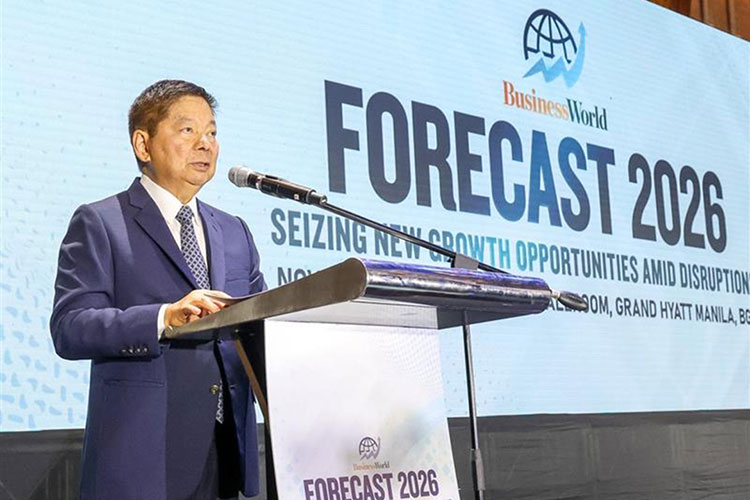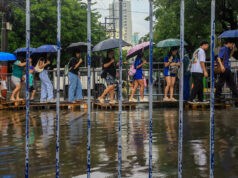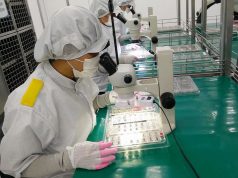Top businessmen seek clarity amid flood issue

By Aubrey Rose A. Inosante, Reporter
TOP Philippine business leaders said investor confidence could still recover despite the drag from a multibillion-peso flood control corruption scandal but stressed that the government should restore credibility and provide a clearer policy direction to sustain investment momentum.
“At times like this, what matters most for markets and businesses is not the noise around us, but the strength of our institutions and the steadiness of our long-term fundamentals,” SM Investments Corp. Chairman Amando M. Tetangco, Jr. said in his keynote address at BusinessWorld Forecast 2026.
 Mr. Tetangco, a former Bangko Sentral ng Pilipinas governor, said the graft scandal, which has eroded sentiment and contributed to slower growth and weaker household spending, should be confronted with fairness and transparency.
Mr. Tetangco, a former Bangko Sentral ng Pilipinas governor, said the graft scandal, which has eroded sentiment and contributed to slower growth and weaker household spending, should be confronted with fairness and transparency.
“In this environment, investors and consumers look for clarity — clarity of direction, policy consistency and disciplined execution,” he said. “Credibility is the foundation of trust, and trust is the foundation of confidence.”
He added that the country’s institutions remain stable and that the Philippines’ macroeconomic strengths continue to “prevail over instability.” Filipinos’ resilience, he said, has been a consistent source of stability through past economic cycles.
Mr. Tetangco said strengthening the Philippines’ appeal as an investment destination would require lowering power costs, diversifying the energy mix, improving predictability in the permitting process and upgrading ports and logistics.
Despite softer third-quarter growth and a series of downgraded forecasts from multilateral institutions, he described the 2026 outlook as “constructive.” He said expansion would be supported by firm domestic consumption, public infrastructure spending and a gradual pickup in private capital expenditure as borrowing costs ease.
BDO Capital & Investment Corp. President Eduardo V. Francisco said executives remain committed to investing in the Philippines even as they wait for stronger government action.
“We have to continue to invest,” he told the BusinessWorld forum. “We have to continue to consume because there’s really a slowdown in government investments… That way, the government will see the need to build the infrastructure to support it.”
Mr. Francisco said his confidence is steadily improving, adding that sustained private sector activity is key to reinforcing the growth momentum amid lingering uncertainty.
“From the micro side, from the bank side, low growth is still there,” he said. “It’s slowed down a bit, but it’s strong… People are going to the malls, sales are improving. It’s going to be a better Christmas for everyone.”
Andrew Jeffries, Asian Development Bank (ADB) country director for the Philippines, said the economy is likely to expand faster in 2026, driven in part by a rebound in public infrastructure spending, though the timing and pace of recovery remain uncertain.
“It’s more of a factor of internal events and actions and proactive positive change rather than external events that could propel that even toward higher growth or stay around that area,” he told the forum, citing the resilience of Filipino households and the “very promising” underlying fundamentals of the economy.
He added that the ADB would continue to engage with the Philippine government, extending technical and financial support to projects while emphasizing strong oversight, adherence to procedural procurement standards and audited project-level financial statements.
Private sector leaders echoed the view that recovery is possible, “as long as we’re united and we stand on common values and principles,” Divina Law founder and Managing Partner Nilo T. Divina said.
‘SINISTER FORM OF DISRUPTION’
Metrobank Chief Economist Nicholas Antonio T. Mapa said that sustained growth would require policy discipline.
“Once again, always go back to the fundamentals,” he told the forum. “Go back to the basics. We’re going to find our stride again, and we’re bound to get back in the economic boom phase.”
“Growth goes to 6% assuming this is next year or the year after,” he added, urging the government to maintain price stability and an appropriate monetary policy stance.
The Philippine economy expanded 5% in the first nine months after a slowdown in the third quarter. Executive Secretary and former Finance Secretary Ralph G. Recto had signaled that the country would likely miss its 5.5-6.5% growth target for the year, citing bad weather and a drag on government spending linked to the flood control probe.
Business leaders highlighted the broader economic risks posed by corruption, beyond the immediate fiscal impact.
Miguel G. Belmonte, president and chief executive officer at BusinessWorld Publishing Corp., said companies face a “sinister form of disruption” that, compounded by political volatility, has weakened the peso, dragged down the stock market and eroded business confidence.
“The embezzlement of public funds cannot be tolerated any longer,” he told the forum. “Transparency is an economic necessity because investors respond to clarity and trustworthy leadership.”
He added that rebuilding confidence would require technological or institutional reform. “Outside of our own corruption crisis, which trumps all other disruptions in shock value, the global environment continues to shift in ways none of us can fully predict.”
Meanwhile, Finance Assistant Secretary Neil Adrian S. Cabiles said the government is taking steps to mitigate risks to growth. Measures include a spending catch-up plan, governance reforms, labor market adaptation programs and enhanced disaster risk management.
“We will still see that the Philippines really has very sound economic fundamentals,” he said. “The Philippines still has promising trajectory, except that it has the issues we have right now.”



